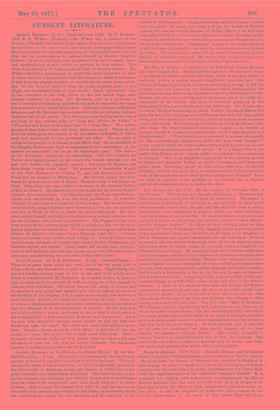CURRENT LITERATURE.
Spanish Reformers of Two Centuries from 1520. By E. Boehmer, after B. B. Wiffen. (Triibner.)—Mr. Wiffen was a member of the Society of Friends ; he travelled into Spain, with the view of promoting the abolition of the slave trade and slavery, having previously made the acquaintance of a Spanish gentleman of enlightened views; he was thus led by circumstances to interest himself in Spanish religions history. So much, and little else, we gather from the extremely vague and unsatisfactory memoir which is prefixed to this volume. The work itself has more of bibliographical than of literary interest. Mr. Wiffen collected a vast amount of knowledge about a number of men, of whom very few persons know even the names, the Spanish reformers. It had been his original intention to include about twenty names in his list. Of the lives of three of these be wrote sketches more or less slight, and he compiled lists of their works. Death " prevented " him in the execution of his task, which he did not indeed begin until already advanced in years. Dr. Beehmer, who is a professor in the University of Strasburg, undertook the task of rendering into shape the materials which he left behind him. This task has been sufficiently laborious, and Dr. Boehmer has performed it with the industry and care characteristic of his nation. The lives have been written anew,—there are three in this volume, those of "Juan and Alfonso de Vald4s," of "Francisco and Jaime de Enzinas," and of "Juan Diaz." The biblio- graphical descriptions have also been done over again. When we add that the editor gives the results of all this labour in English, it will be seen how laboriously he has performed his office. We are glad to notice in his preface a testimony to the effect that "the accessibility of the English libraries And their arrangement for the convenience of the readers are unequalled," as far as his experience goes. The notices of the Reformers mentioned are interesting. The two brothers De Tables were happy enough. to die before the breach between the old and new beliefs was regularly opened. Francisco de Euzinas was
• born about twenty years later. He presented a translation of part of the Now Testament to Charles V., and was thrown into prison. From this ho escaped to Wittenberg. His brother James had been 'burnt for heresy meanwhile at Rome. Francisco died of the plague in 1552. Juan Diaz, who was a fellow-townsman of the brothers Valdds,
• settled at Geneva. He was murdered near Augsburg by his own brother Alfonso, who was a priest. The Emperor and the Pope exerted them- selves, and successfully, to save him from punishment. A fratricide dictated by zeal seemed to them not to be a crime. The wretched man seems to have judged himself more severely, for he pat an end to his own life, at Trent, in 1551, i.e., about six years afterwards. His pre- sence at the Council, probably in attendance on a prelate, indicates that he was in favour with persons of importance. The Papacy had not then been driven by the modern spirit which it ee hates to disavow the theo- logical palliation of assassination. We note an interesting quotation from Alfonso de Castro's "Adversus Omnes FItereses, Libri XV.":—"Omnis enim homo potest errare in fide, etiam si Papa sit. Nam de Liberia papa onstat fuisse Ariauum, et Anastasium papam favisse Nestorianis, qui histories legerit, non dubitat. Quod antem alii dicunt, onto, qui erre- verit in fide obstinate, jam non ease papam, ac per hoc affirmant papam non posse ease hereticum eat in re seria verbis velle jocari."


































 Previous page
Previous page